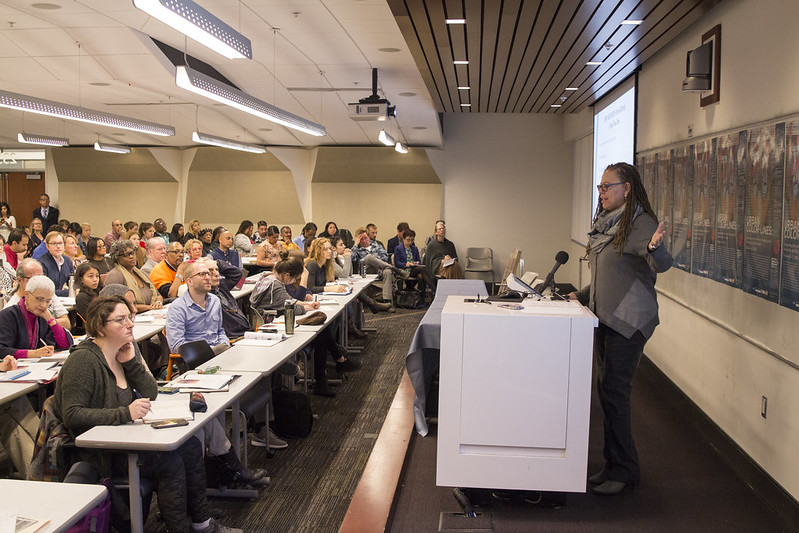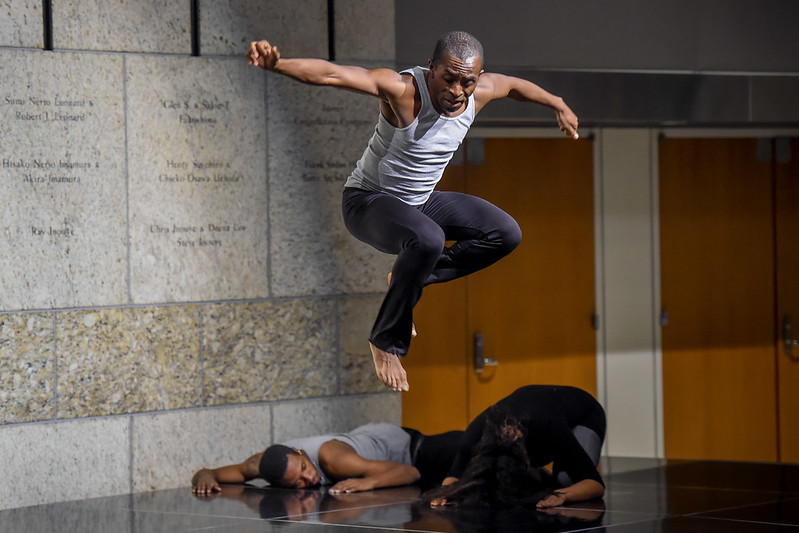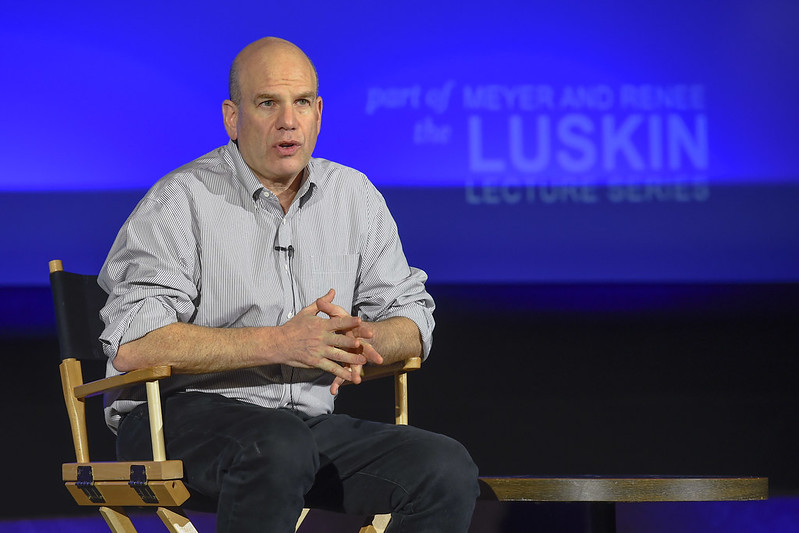By Stan Paul and George Foulsham
In one of the poorest neighborhoods of Chicago, an African-American mother and her children face eviction amid a patchwork landscape of foreclosed and empty dwellings.
Across the globe and in another hemisphere, South African shack dwellers face the constant fear of eviction, violence and police brutality in the post-Apartheid era.
In Delhi, India, where more than 75 percent of inhabitants reside in “unplanned” and, therefore, “spatially illegal” dwellings, basic necessities such as water are denied.
And, south of the United States, the poor in countries such as Brazil experience a familiar scenario: eviction and being pushed out to the favelas, at the periphery of the urban center.
These are the “dispossessions of our times,” and the “enduring color-lines” of the 21st century, say founders and collaborators of the new Institute on Inequality and Democracy at UCLA Luskin. The launch of the new center at UCLA brought together scholars from various disciplines as well as those on the front lines of grassroots efforts fighting eviction and social injustice worldwide.
“The theme of Urban Color-Lines is especially important for us today in Los Angeles, a city and region marked by its own historic struggles for equality and justice,” Lois Takahashi, Interim Dean of the UCLA Luskin School of Public Affairs and professor of Urban Planning, said in her opening remarks.
The two-day event, held at UCLA and Los Angeles venues, included not only scholars and activists but artists, performers and a movie screening to give expression to these global and ongoing problems, to highlight these issues and to bring to the fore emerging efforts to fight eviction, displacement and discrimination.
“The scope and purpose of the Institute have been shaped in conversation with movements such as the L.A. Community Action Network and the Chicago Anti-Eviction Campaign,” said Ananya Roy, founding director of the new center. “You will see how we strive to learn from these movements, their ideas and practices,” which create openings for social change, added Roy, who is also a professor of Social Welfare and Urban Planning at Luskin.
“We are launching the Institute on Inequality and Democracy this week with an ambitious mandate: to advance radical democracy in the world through research, critical thought and alliances with social movements and racial justice activism,” Roy said. “In doing so, we recognize that democracy is not an antidote to inequality; that, in fact, democracy is constituted through inequality.”
Day 1
Markets, Race, and the Aftermath of Slavery

SLIDE SHOW: 131 Photos, Urban Color-Lines: Inaugurating the Institute on Inequality and Democracy at UCLA Luskin
Providing context for day one was UCLA law professor Cheryl Harris, a recognized leader in civil rights education and critical race theory. The author of “Whiteness as Property,” an important and influential law review treatise, discussed how slavery was not a pre-capitalist system, but quintessential in the system of trade and finance and “central to the development of capitalism itself.”
“The market is not a neutral field,” said Harris, outlining the role that race continues to play in the making of exclusion as well as profit. For example, she noted that the high and disproportionate rate of minority incarceration in America provides cost savings in the form of labor as well as a market for products of prison labor. Harris added that the incarcerated themselves are also forced to be consumers of goods and services related to their incarceration.
The Right to the City: From South to North
Harris’ keynote presentation led into contributions by scholars and activists representing ongoing worldwide struggles against eviction, banishment and spatial injustice from Chicago and Brazil to South Africa and India.
Toussaint Losier, assistant professor at the University of Massachusetts-Amherst, and co-founder of the Chicago Anti-Eviction Campaign, shared his experiences from the front lines of anti-eviction action, including eviction blockades, inspired by work being done in South Africa. “Why aren’t you doing this in the U.S.?” was the take-away question from a trip to South Africa by Losier, who said that this connection became the model for action in Chicago.
Raquel Rolnik, professor, architect and urban planner from Brazil, and former Special Rapporteur on Adequate Housing at the United Nations, spoke about a global pattern of evictions and land grabs fueled by financialization. She described this as a “permanent transitory” state for the urban poor.
“The language of liberalism and the markets is inadequate to describe the world we are living in,” said Richard Pithouse, a scholar at Rhodes University in South Africa. Pithouse said that a “proper name” does not yet exist in academia. “Maybe it is in the struggle but not in the university,” said Pithouse, asking where the locus of academic work should be. “It’s a messy space, but it is the space if you are serious about struggle.”
Gautam Bhan, who teaches urban politics, planning and development at the Indian Institute for Human Settlements in Bangalore, also looked inward at institutions such as universities to talk about the problem of inequality.
“Institutions have become predictable. We’ve lost the ability to fight with anyone that thinks another way … some of our thinking has to be about practice,” said the Berkeley-trained scholar (and former student of Ananya Roy), who has focused on the politics of poverty in India including urban displacement and affordable housing. Bhan described India’s contemporary politics of “you shouldn’t be here” to explain the predicament of the overwhelming majority of people who are unrecognized as residents and do not have a “right to the city.”
Black, Brown and Banished: Ending Urban Displacement in 21st Century Democracies

SLIDE SHOW: 65 Photos, Black Brown & Banished: Ending Urban Displacement in 21st Century Democracies
The first day of the institute’s inauguration concluded with an evening gathering at the Japanese American National Museum in downtown Los Angeles. It included a series of dramatic arts performances, and ended with a panel discussion on eviction/action featuring testimony of those who have both lived through and fought back against eviction.
The performances included a reading, Nonfiction Eviction Depiction: Excerpts from Oral History Transcripts, featuring Bernard Brown, Dorothy Dubrule and Robert Een; and a dance performance, “Champion,” featuring Valerie Braaten, Leanna Bremond, Timna Naim, Silvia Park, Raphael Smith and Bernard Brown, who also wrote and directed the performance.
The anti-eviction discussion included dramatic testimony from Ashraf Cassiem, of the Western Cape Anti-Eviction Campaign in South Africa; Willie “JR” Fleming, with the Chicago Anti-Eviction Campaign; Patricia Hill, also with the Chicago Anti-Eviction Campaign; and Pete White, with the LA Community Action Network, who wore a t-shirt that said “This Is a Movement, Not a Moment.”
Fleming talked about his group’s campaign in Chicago, calling what was happening there an “urban and economic cleansing.” He proudly pointed out that the members of the anti-eviction campaign “broke the law to change the law.”
And Hill, a retired police officer and public school teacher, recounted how banks twice arbitrarily increased her mortgage payments on a house she had owned for years, almost forcing her and her children to move out, until the anti-eviction campaign stepped in and helped her save the home in 2011. “I’m still there,” she said to loud applause.
“This is about our responsibility to leave a world that’s better for our women and children,” Fleming said.
Day 2
Debtors’ Prisons and Debtors’ Unions: Direct Action in Finance Capitalism
Hannah Appel is a UCLA scholar who describes herself as an economic anthropologist and an activist who looks at the daily life of finance capitalism and debt through different lenses: as “racialized social control” and as a “potential platform for collective action.” Appel, who also works with ongoing Occupy Wall Street projects such as Debt Collective, said her viewpoints are grounded and informed by her work as an organizer, thinker, critic and dreamer in this “particular moment in finance capitalism.”
“I want to talk about how capitalism shape shifts, about how attention to the everyday life of finance and its inverse, debt, offers unexpected opportunities for financial disobedience, rupture and transformation,” said Appel. She pointed out that while the debt financing of everything has rewarded the creditor class from the time of colonial plunder and the trans-Atlantic slave trade, today it has left the overwhelming majority of U.S. households with consumer debt. This debt includes college, health care, housing, “and even our own human caging, or incarceration,” said Appel. She also discussed the more virulent forms of debt like pay day loans — so-called high-interest, sub-prime world of “ghetto loans” to modern debtors prisons as described in U.S. cities such as Ferguson.
“In sum, questions of debt, colonialism and sovereignty within and beyond the U.S. are everywhere still with us,” she said.
But, Appel said, using the “economic imagination” envisions possibilities for radical action within and against finance capitalism, including disrupting the way debt is thought about, as shameful or moral failure. “In this terrain of mass indebtedness … what might economic disobedience look like?” she asked, pointing to the collective leverage of debt, which can be powerful, and which she said is taking hold in America.
“You get inspiration in the weirdest places,” said Appel, citing J.P. Getty: “If you owe the bank $100, that’s your problem. If you owe the bank $100 million, that’s the bank’s problem.” Extending this to the more than $1.3 trillion in student debt, Appel said “Together, arguably, in different moments and different configurations, we can be the bank’s problem.”
Decolonizing the University
An international group of scholars and activists examined the role that the university plays now and can play in the future, not only as an outside, objective observer, but from within the institution.
Gaye Theresa Johnson, an associate professor of African American Studies and Chicano Studies at UCLA, has been active with the Los Angeles Community Action Network’s efforts for housing and civil rights in L.A.’s skid row area. The author of a book on “spatial entitlement “ in Los Angeles described the university as a site of invention and of contestation.
“We have to rethink the nature of knowledge itself. We have to do a psychic overhaul, really, of the perception of the work that we do,” said Johnson.
Camalita Naicker is a Ph.D. candidate from Rhodes University in South Africa, where she is studying the practice of popular politics in that country. She is also a student activist in the Black Student Movement at Rhodes, writing about urban land occupations and popular movements in South Africa. Her presentation questioned what an African university today should look like, what it should teach and being a black student in colonial space.
“Who teaches and what they teach matter,” said Naicker, asking what an affordable education in South Africa might look like in a decolonized university.
“Dominant knowledge produces and reproduces coloniality of knowledge and power,” said Carlos Vainer, an economist and sociologist at the Institute of Urban and Regional Planning and Research and the Federal University of Rio de Janeiro. Hoping to put some “fingers in the wounds,” he included both universities and scholars as part of this dynamic in which “coloniality is co-essential to modernity, to capitalism.”
Vainer said that while the necessity of decolonizing the university is clear, how this is possible is not, pointing to both “new relations with non-academic knowledge” in the north and south as well as reciprocity of scholarship. “You must read us,” he said, citing the lack of translated scholarly works in his own country to use in mainstream academia.
Marques Vestal, a doctoral student in history at UCLA, grew up in Los Angeles, which provided him with an up-close view of black housing politics, culture and residential segregation. And, as a student, his interest is in the implications of private student debt, “a material relationship contrary to social justice,” which produces a mass of indebted students, he said.
“Indebtedness restricts movement,” and “makes commitments to social justice precarious,” said Vestal, describing what it is like for students whose education is “a commodity that must be purchased.”
The Audacity of Despair

SLIDE SHOW: 59 Photos, The Audacity of Despair with David Simon
David Simon, the journalist, screenwriter and producer of the award-winning HBO series “The Wire,” provided the exclamation point for the two-day inauguration of the institute. His appearance, part of the Luskin Lecture Series, entertained and informed the crowd at UCLA’s James Bridges Theater.
“As Mr. Simon’s creative and journalistic contributions indicate, the university is not the sole producer of knowledge,” Roy said as she introduced Simon. “It is not the sole mover of debates. But it has a role. And it has a responsibility.
“It is the role and responsibility of the university, among other actors, to challenge policies, to contest the willful separation of two separate societies, and, perhaps, to acknowledge how we might also be complicit in producing and perpetuating those policies,” Roy added.
After a screening of an episode of “Show Me A Hero,” another Simon series on HBO, he spoke passionately about, among other things:
The war on drugs: “It was a war about dangerous narcotics, but in truth it was a war on the poor.”
Democracy: “Democracy itself is centrist and incremental. If you’re doing the right things, it gets a little better every day. If you’re doing the wrong things, it gets a little worse every day. Freedom is never won entirely.”
And what can be done: “The only solution for bad government or a weak democracy is better government and a stronger democracy — to have a democracy start to engage democratic ideals, representative ideals and to represent the entire society. It’s all hard work. There’s no singular moment. Let’s start by getting rid of the drug war. That’s job one.”
Finally, Simon gave a heartfelt blessing and endorsement to the new Institute on Inequality and Democracy at UCLA Luskin.
“I’m very enamored of the idea of this institute being here,” Simon said. “I can’t think of anything that a university can do that would be more important than to address these issues and to argue these issues.”



